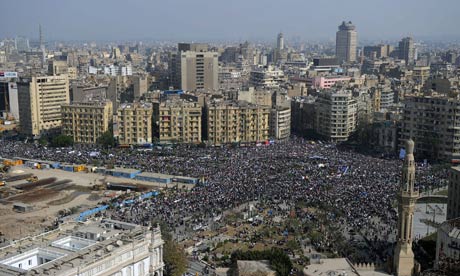By Daniel M. Austin
Impunity Watch Reporter, Africa

CAIRO, Egypt -On Friday, February 4, hundreds of thousands of people streamed into Tahrir Square to protest against Egyptian President Hosni Mobarak. The Friday protest, billed as “Departure Friday” follows two days of bloody clashes between anti-government demonstrators and pro-government supporters. The violence has left dozens of people killed and hundreds more injured. As President Mobarak clings to power, the international community is contemplating what to do next.
The Friday protest marks the 11th day of demonstrations and many in Tahrir Square do not plan on leaving until President Mobarak is removed from office. Organizers of the protest were hoping to turn out one million demonstrators but initial estimates are closer to two hundred thousand. Reports from Tahrir Square claim the atmosphere is festive, with less violence than has been seen in the past couple of days. The composition of the protesters cuts across social, economic, and religious lines. There is a mix of upper and middle class Egyptians as well as people with more moderate means. Additionally, the protesters include both Muslims and Christians.
The 11 days of protest have seen a mix of peaceful demonstrations as well as bloody clashes between anti-government supporters and Mobarak sympathizers. One reason for Friday’s calm atmosphere in Tahrir Square is due to the Egyptian army’s renewed presence. The army, which initially asserted itself during the first few days of the protest, then fell back as the pro and anti government factions clashed, has once again reasserted itself creating a security perimeter around the square. The army’s security barrier has helped to limit clashes between the opposing parties and create a more organized and safer environment.
Although Tahrir Square, also known as Liberation Square, has been the focus of intense media coverage, other acts of civil disobedience and protest have taken place in cities through Egypt including Giza and Alexandria.
Estimates vary widely on the number of people injured and killed since the demonstrations began. Anti-government protesters wounded in the clashes have received medical treatment from both the Egyptian military as well as make shift hospitals that have sprung up in mosques around Tahrir Square. The Egyptian health minister claims that eight people have been killed and over eight hundred others have been wounded. On the other hand, the United Nations estimates that more than 300 people have been killed throughout Egypt while 4,000 people have been injured since the protests began on January 25.
INTERNATIONAL RESPONSE
The response from the International community to this crisis has been restrained. The United States, Spain, France, Italy, Germany and England have expressed concern for the safety of protesters while at the same time calling on the Egyptian government to make necessary reforms. Unfortunately, difficult questions about how quickly President Mubarak should leave office and who should step into his position still remain. Several days ago, President Mubarak claimed he would not seek re-election in September of 2011; however this concession has not appeased the protesters who are looking for him to leave office immediately.
As the situation in Egypt has become more intense, the international community has become more forceful with its words. The United States, who initially claimed support for President Mubarak, has been working hard to get out in front of this crisis. President Obama has recently made statements calling for political reforms to take place “now”, but he has been careful not to call for President Mubarak to step down immediately. Similar sentiments have been echoed by the leaders of other nations, including several European countries that sent a letter to the Egyptian President asking him to create a transitional government.
Furthermore, news outlets are reporting the United States is trying to broker a deal where President Mubarak will step down and his Vice President Omar Suleiman would assume power. The plan would call for Vice President Suleiman along with Egypt’s military leadership to form a transitional government until elections can be held. Conversely, other media outlets claim that the United States has already offered this suggestion and it has been rebuffed by the Egyptian President. Questions remain about whether Mr. Suleiman or the Egyptian military would want to break away from President Mubarak. The ties between the Egyptian President, his leadership team, and the Egyptian military continue to be tested. These ties will become further restrained as the protesters in Tahrir Square plan a march on the presidential palace.
For more information, please see:
Al Jazeera – Egypt Holds ‘Day of Departure’– 4 February 2011
All Africa – Clashes Rock Cairo as Pro-Mubarak Supports Hit Back – 3 February 2011
BBC – ‘Day of departure’ rally in Egypt—4 February 2011
New York Times — White House and Egypt Discuss Plan for Mubarak’s Exit – 4 February 2011
Reuters — Egyptians rally for Mubarak to go now – 4 February 2011
The Guardian — US hatches Mubarak exit strategy as Egypt death toll mounts – 4 February 2011



